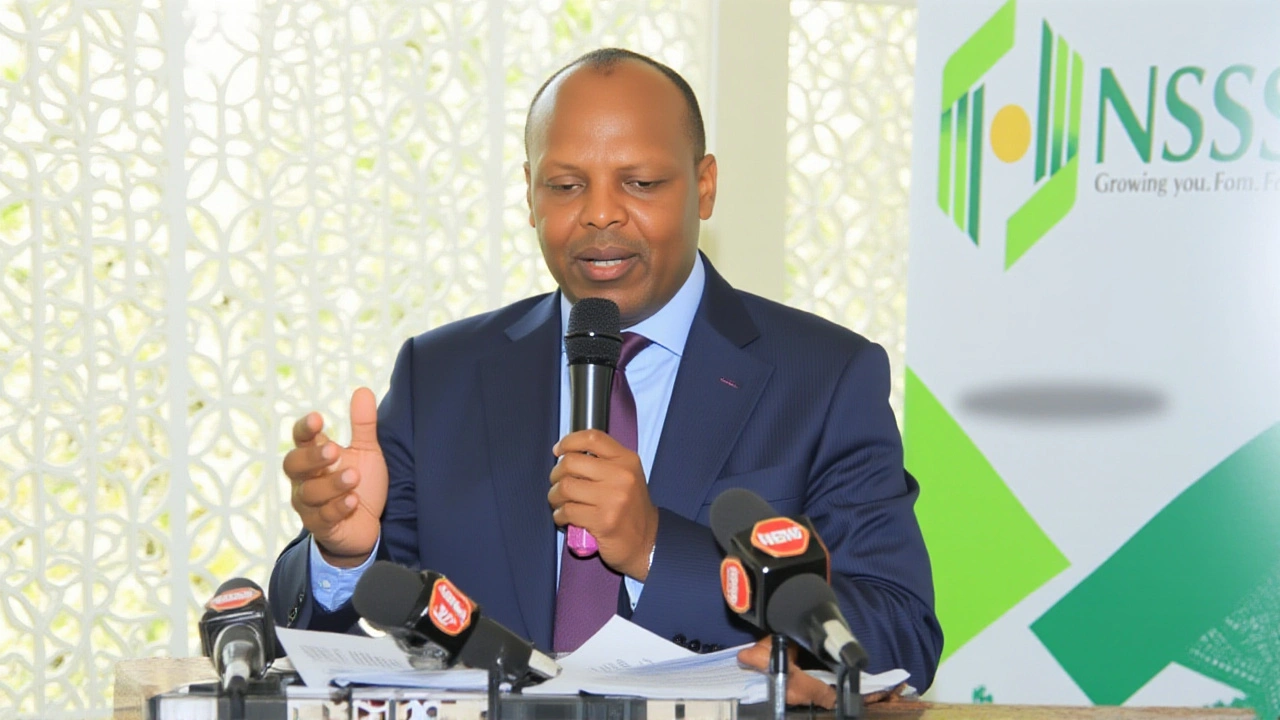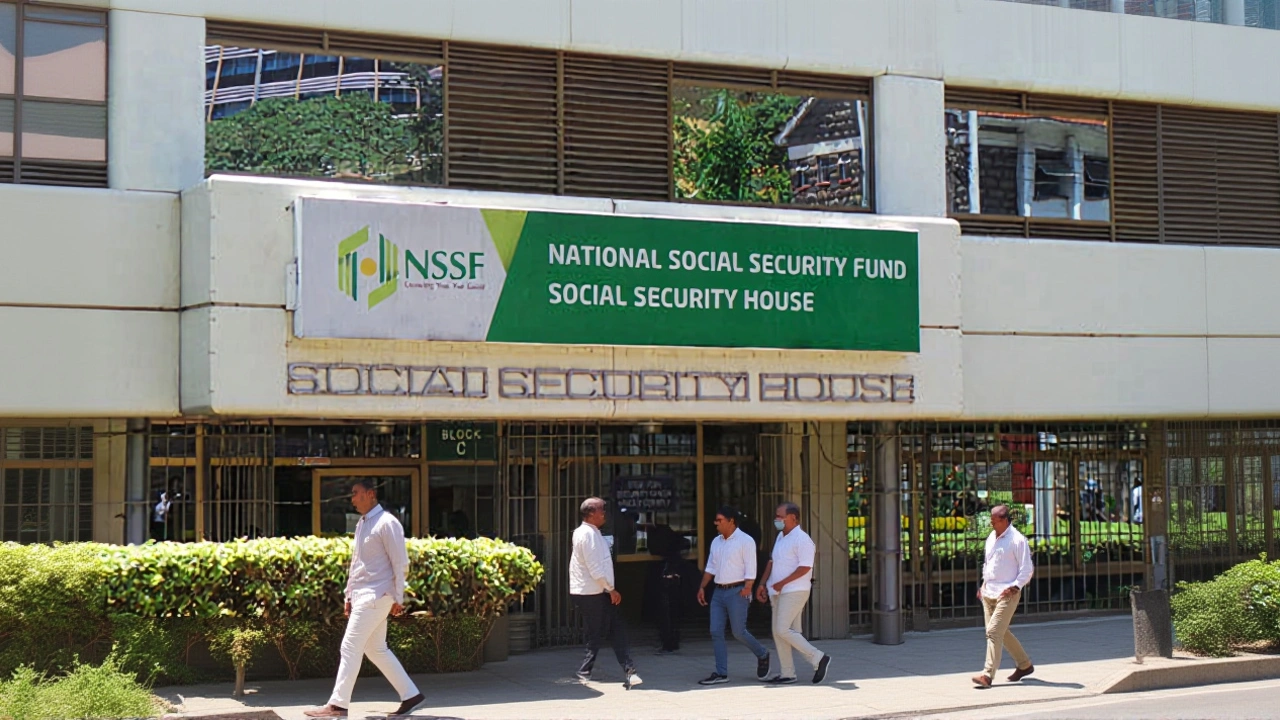When Kuria Kimani, chair of the Finance and National Planning Committee and MP for Molo, learned that the Capital Markets Authority (CMA) had sat on warnings about irregular bond trades, she didn’t waste any time. The committee has now summoned the regulator to explain a potential NSSF loss of up to Sh2 billion that could dent the retirement savings of millions of Kenyan workers. The summons comes after the Central Bank of Kenya (CBK) told parliament that it had alerted the CMA as early as August 2023 about suspicious transactions involving the National Social Security Fund (NSSF).
Background to the NSSF Investment Controversy
The controversy traces its roots to a series of bond purchases and sales made between May and July 2024. According to a letter dated 19 August 2023, Kamau Thugge, Governor of the Central Bank of Kenya, flagged the trades as “potentially irregular” and asked the CMA to intervene. A follow‑up note on 1 August 2024 repeated the same concerns, attaching detailed transaction data that showed bonds worth Sh5.2 billion were sold for just Sh4.32 billion – a shortfall of Sh789.2 million.
Those bonds were held in accounts linked to the NSSF Central Securities Depository (CSD) and involved a private individual, Humphrey Wachira Gichuru, as well as Pergamon Investment Bank Limited. The arrangement raised eyebrows because the NSSF’s 2020 Investment Policy Statement explicitly requires that all investments be "prudent" and aimed at maximising returns for contributors.
Parliamentary Action and CMA Summons
During a session on 5 March 2025, the committee’s chairperson announced a written demand for the CMA to appear before Parliament. “We will write to them to appear before us and shed light on these NSSF dealings where pensioners are feared to have lost up to Sh2 billion,” Kimani told fellow lawmakers. The call‑up is not just a political gesture; it’s a legal push to force the regulator to disclose why it waited until March 2025 to request additional information, despite having been warned months earlier.
The CMA, founded in 1989 under the Capital Markets Act, responded that it needed “more comprehensive data on NSSF’s stock‑market activities from September 2023 to September 2024.” Critics argue that the regulator’s own delay contributed to the loss, a point that will be examined in detail during the forthcoming hearings.
Audit Findings and Financial Impact
In its FY 2023/24 report, Auditor‑General Nassy Gathungu highlighted three main red flags:
- Shares in East Africa Portland Cement, Sameer Africa and Athi River Mining fell from a combined valuation of Sh221 million in June 2022 to Sh170 million by the end of the audit period – a loss of roughly Sh50 million.
- Bonds sold at a discount created a Sh789.2 million shortfall, breaching the NSSF’s own investment policy.
- Investments were made in cash‑strapped companies, raising questions about the due‑diligence performed by the six external fund managers overseeing the fund.
When NSSF CEO David Koross appeared before the Public Investments Committee on Social Services, Administration and Agriculture (PIC‑SSAA), he admitted that the bond sales were “off‑loaded at a loss” but insisted that the decisions were delegated to the external managers under the fund’s policies. “We acted in good faith based on the advice we received,” he said, a line that many observers found unsatisfying.
Reactions from Regulators and Stakeholders
CBK’s Governor Thugge reiterated that the central bank had fulfilled its duty by flagging the trades in writing. “We cannot sit back while public resources are mis‑managed,” he told the committee, adding that the bank had also been monitoring the new Sh10 billion core‑capital requirement for commercial banks.
Members of the opposition, like Saboti MP Caleb Amisi, questioned the efficiency of letting six fund managers operate with “full discretion.” He asked, “Was this really the most efficient way to invest Sh12 billion in bond transactions?” The sentiment was echoed by pensioner advocacy groups, who staged a brief protest outside Parliament, holding placards that read “Our retirement, not their profit.”

Potential Implications for Kenya’s Pension Landscape
If the CMA is found negligent, it could face stricter oversight from Parliament, possibly leading to legislative reforms that tighten the reporting requirements for pension fund investments. Some analysts predict that the episode may accelerate the push for a more transparent, real‑time monitoring platform linking the CBK, CMA, and major pension schemes.
Beyond regulatory reform, the scandal could erode confidence in the NSSF, prompting workers to consider alternative private pension schemes. That shift would have a cascading effect on the capital markets, where the NSSF has traditionally been a large, stable investor.
What Comes Next?
The CMA is expected to appear before the Finance and National Planning Committee within the next two weeks. Lawmakers have said they will consider sanctions if the regulator cannot justify the delay. Meanwhile, the Auditor‑General’s office is preparing a follow‑up report that may recommend criminal investigations into the individuals directly involved, including Humphrey Wachira Gichuru and senior officials at Pergamon Investment Bank.
For pensioners, the immediate concern is whether the lost Sh2 billion can be recovered. The committee has already signalled that any restitution, if possible, will be pursued aggressively.
Frequently Asked Questions
Why did the CMA wait months before responding to the CBK’s alerts?
The CMA says it needed more detailed data on NSSF’s stock‑market activity to assess the risk. Critics argue that the regulator’s own procedures were too slow, allowing the loss to materialise.
Which investors are most affected by the alleged Sh2 billion loss?
The primary victims are Kenyan workers who contribute to the NSSF. Their retirement savings are pooled in the fund, so any shortfall directly reduces future pension payouts.
What legal actions could Parliament take against the CMA?
Parliament could move to amend the Capital Markets Act, impose fines, or even suspend certain regulatory powers until reforms are implemented. A formal inquiry could also lead to criminal referrals.
How did the bond transactions violate NSSF’s 2020 Investment Policy?
The policy requires investments to be made prudently and to maximise returns. Selling Sh5.2 billion worth of bonds for only Sh4.32 billion created a shortfall of nearly Sh800 million, directly breaching the policy’s prudence clause.
What are the next steps for the Auditor‑General’s investigation?
A follow‑up report is due later this year. It may recommend criminal investigations into the individuals and firms directly involved, and could suggest systemic reforms for pension fund oversight.


J T
October 7, 2025 AT 21:23Wow, the CMA really dropped the ball on this one 😤. They had the heads‑up months ago and still snoozed while workers’ futures were at stake. This is exactly why we need tighter watchdogs.
A Lina
October 7, 2025 AT 22:46The procedural latency exhibited by the Capital Markets Authority constitutes a flagrant breach of its fiduciary obligations under the Capital Markets Act. By disregarding the Central Bank's August 2023 alert, the regulator effectively abetted a sub‑optimal disposition of NSSF assets, contravening the prudential investment policy stipulated in 2020. Such dereliction of duty undermines market confidence and necessitates immediate statutory redress.
Virginia Balseiro
October 8, 2025 AT 00:10Can you believe the drama unfolding? 😱 This is the kind of crisis that rallies us all to demand transparency and real change! Let’s push for a real‑time monitoring platform so pensioners never face this again. Together we can turn this mess into a catalyst for stronger governance!
Jared Mulconry
October 8, 2025 AT 01:33It’s clear that miscommunication played a role, but blaming only the CMA might overlook systemic gaps across institutions. Perhaps a collaborative forum between CBK, CMA, and NSSF could foster better information flow. A measured approach may prevent future losses while preserving stakeholder trust.
Brandon Rosso
October 8, 2025 AT 02:56While the situation is undeniably serious, I remain optimistic that legislative reforms will emerge promptly. The Finance Committee’s summons signals a commitment to accountability, and I trust that the ensuing hearings will yield concrete recommendations. Let us support these efforts and look forward to a more resilient pension framework.
Tracee Dunblazier
October 8, 2025 AT 04:20Indeed, the urgency cannot be overstated; however, a balanced critique is essential. The CMA should justify its data‑gathering timeline, and the NSSF must review its delegation practices. Accountability from all parties will restore confidence.
Edward Garza
October 8, 2025 AT 05:43This is another bureaucratic circus.
Allen Rodi
October 8, 2025 AT 07:06For anyone curious about the bond discount, the NSSF sold Sh5.2 billion worth of bonds for Sh4.32 billion, creating a shortfall of roughly Sh789 million. That loss could have been mitigated with tighter due‑diligence on price volatility. It’s a classic case of selling low without a proper market assessment.
Jody Webster
October 8, 2025 AT 08:30Hold on-are we really supposed to think that the regulators *never* had the data??? I mean… the whole thing seems...overblown?? Maybe the issue isn’t the CMA but the way we all jump to conclusions!!!
Steve Goodger
October 8, 2025 AT 09:53Friends, let us take a moment to reflect on the broader implications of this episode for our collective financial well‑being; the loss of Sh2 billion is not merely a number, but a stark reminder of the interconnectedness of regulatory oversight, fiduciary responsibility, and the everyday worker’s retirement security.
First, we must acknowledge that the Capital Markets Authority’s delayed response, despite early warnings from the Central Bank, illustrates a systemic gap that can be bridged through enhanced data-sharing protocols.
Second, the NSSF’s reliance on external fund managers underscores the necessity for rigorous internal audit mechanisms that scrutinize investment decisions in real time.
Third, the auditors’ findings on deteriorating asset valuations highlight the importance of periodic stress testing for pension portfolios.
Fourth, the parliamentary summons serves as an essential democratic check, affirming that public institutions are answerable to the citizens they serve.
Fifth, the potential legislative reforms, such as tighter reporting requirements and real‑time monitoring platforms, could set a new standard for transparency in emerging markets.
Sixth, it is vital for all stakeholders-regulators, fund managers, and contributors-to engage in constructive dialogue, fostering a culture of shared accountability.
Seventh, the experience offers a teachable moment for other pension schemes across Africa to proactively audit their investment pipelines.
Eighth, by embracing technology‑driven oversight, we can minimize future discrepancies and protect contributors’ interests.
Ninth, the role of civil society and advocacy groups remains crucial in keeping the spotlight on such issues and ensuring that reforms are not merely rhetorical.
Tenth, while the immediate focus is on possible restitution, the long‑term goal should be to institutionalize safeguards that prevent recurrence.
Eleventh, this incident should inspire a renewed commitment to financial literacy among contributors, empowering them to ask informed questions.
Twelfth, collaborative efforts between the CBK, CMA, and NSSF can establish a unified framework for risk assessment.
Thirteenth, the lessons learned here reinforce the value of proactive, rather than reactive, governance.
Fourteenth, let us support the investigative process with patience and optimism, trusting that justice will be served.
Fifteenth, in the spirit of inclusivity, we must ensure that the outcomes of these inquiries benefit all Kenyans, especially the most vulnerable retirees.
Sixteenth, together, we can transform this setback into a catalyst for stronger, more resilient pension stewardship for future generations.